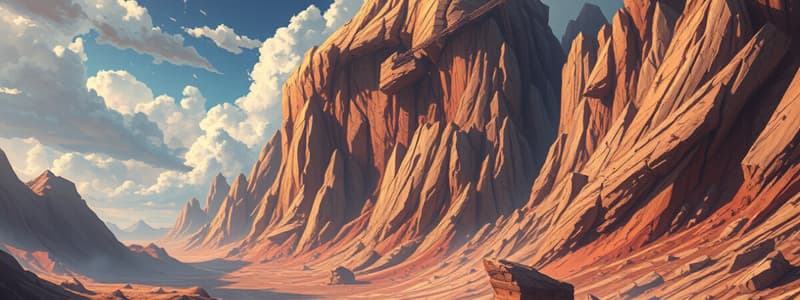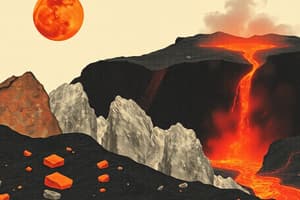Podcast
Questions and Answers
What is considered the most reliable physical property for identifying minerals?
What is considered the most reliable physical property for identifying minerals?
- Hardness (correct)
- Cleavage
- Streak
- Color
Which of the following minerals is the hardest according to Mohs hardness scale?
Which of the following minerals is the hardest according to Mohs hardness scale?
- Diamond (correct)
- Corundum
- Topaz
- Apatite
What is the tendency of a mineral to break along definite structural planes called?
What is the tendency of a mineral to break along definite structural planes called?
- Streak
- Fracture
- Cleavage (correct)
- Color
Which mineral can be scratched by a steel nail?
Which mineral can be scratched by a steel nail?
Which of the following minerals is often used as a reference in mining due to its specific hardness level?
Which of the following minerals is often used as a reference in mining due to its specific hardness level?
Which of the following is NOT a reliable method for identifying minerals?
Which of the following is NOT a reliable method for identifying minerals?
Which mineral can be scratched with a fingernail according to the Mohs scale?
Which mineral can be scratched with a fingernail according to the Mohs scale?
What criterion did the International Mineralogical Association develop from James Dana's classification?
What criterion did the International Mineralogical Association develop from James Dana's classification?
What is the purpose of the milling/crushing stage in the mining process?
What is the purpose of the milling/crushing stage in the mining process?
During what phase of mining does actual excavation of minerals take place?
During what phase of mining does actual excavation of minerals take place?
What is a significant challenge during the closure and reclamation phase of mining?
What is a significant challenge during the closure and reclamation phase of mining?
Which method is NOT mentioned as a way to separate high-grade ores during ore extraction?
Which method is NOT mentioned as a way to separate high-grade ores during ore extraction?
What initial condition is necessary for drilling a geothermal power plant?
What initial condition is necessary for drilling a geothermal power plant?
What happens to water when it reaches the surface in a geothermal power plant?
What happens to water when it reaches the surface in a geothermal power plant?
What is crucial for the operation of a cooling tower in a geothermal plant?
What is crucial for the operation of a cooling tower in a geothermal plant?
What is the primary function of a generator in a geothermal power plant?
What is the primary function of a generator in a geothermal power plant?
What is the first step in the mining process?
What is the first step in the mining process?
Which method of mining involves removing ore from the surface of the earth?
Which method of mining involves removing ore from the surface of the earth?
What is the purpose of core drilling in the mining process?
What is the purpose of core drilling in the mining process?
What does the term 'gangue' refer to in the context of mining?
What does the term 'gangue' refer to in the context of mining?
Which of the following is NOT a type of surface mining?
Which of the following is NOT a type of surface mining?
What main factor drives the rock cycle?
What main factor drives the rock cycle?
What is evaluated during the exploration phase of mining?
What is evaluated during the exploration phase of mining?
What is the main objective of modeling ore deposits?
What is the main objective of modeling ore deposits?
Flashcards are hidden until you start studying
Study Notes
Rock Transformation
- Shale transforms into hornfels, quartz into quartzite, and limestone into marble; these are non-foliated metamorphic rocks.
- Slate is used for chalkboards, while quartzite and marble serve as construction materials.
Rock Cycle
- The rock cycle is a slow, continuous process driven by Earth's internal heat and solar energy, involving transformations between different rock types.
Mining Process
- Mining involves the extraction of mineral resources from the Earth's surface.
- Ores are naturally occurring materials that can be profitably mined and are composed of valuable minerals mixed with gangue, which is unprofitable.
Steps in Mining
- Exploration: Involves prospecting, evaluating land geology, analyzing soil/water samples for minerals, and core drilling to create ore deposit models.
- Development and Design: Entails determining the mining scope, chosen mining method (surface vs. underground), and planning for safe extraction.
- Surface mining includes techniques like open-pit and strip mining.
- Underground mining employs shafts to reach deeper ores.
- Construction: Involves building infrastructure like roads, processing facilities, employee housing, and environmental management systems.
- Production: The stage where minerals are actively mined and processed.
- Milling/Crushing: Ore is crushed, processed, and waste materials are removed.
- Ore Extraction: Separation of valuable minerals/metals from soil and gangue through gravity, flotation, or chemical separation methods.
- Refining: Cleaning minerals/metals using processes like smelting and dredging.
- Closure and Reclamation: Closing the mine and restoring the land, often neglected due to financial constraints.
Energy Resources
- Renewable energy resources replenish quickly and include geothermal energy derived from heat within the Earth's surface.
- Geothermal plants require drilling up to 1-2 miles deep to access hot water/steam, ideally located near volcanic activity.
Geothermal Power Plant Process
- Drilling wells bring steam or hot water to the surface.
- Pressure drop causes hot water to turn into steam, which spins a turbine connected to a generator to produce electricity.
- A cooling tower converts steam back to water, which is then reinjected into the ground for recycling.
Freshwater Sources
- Freshwater, found in glaciers, ice sheets, and underground, interacts in various cycles like the nitrogen, carbon, and water cycles.
Minerals and Rocks
- Rocks are made of specific elements and compounds known as minerals.
- James D. Dana established the first standardized classification system for minerals in the 1850s; the International Mineralogical Association refined this definition.
Mineral Properties
- Color: Can indicate certain minerals but is not universally reliable due to variations.
- Streak: Refers to the color of a mineral in powdered form and can aid identification.
- Hardness: Measured on Mohs scale; minerals range from talc (1) to diamond (10) based on scratch resistance.
- Cleavage: The tendency of minerals to break along specific planes based on their crystal structure.
Studying That Suits You
Use AI to generate personalized quizzes and flashcards to suit your learning preferences.




